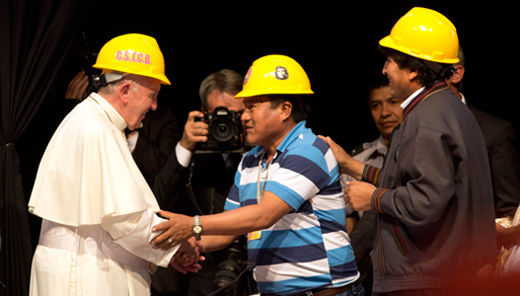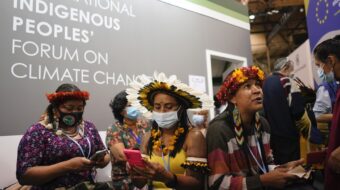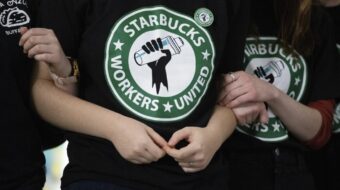
WASHINGTON (PAI)-Strongly religious voters – even usually cynical political independents-strenuously back Pope Francis I’s stands against racism, denouncing income inequality and for worker rights, among other issues, a new survey shows.
The survey, commissioned by the AFL-CIO and the Service Employees, comes as workers, the labor federation and their allies ready themselves for Francis’ visit to the U.S. this fall, including stops in New York, Philadelphia and D.C.
AFL-CIO President Richard Trumka has already pledged to put “all the resources of the labor movement” to help and greet the Pope when he comes to the U.S.
“The poll revealed religiously affiliated voters support an agenda that fosters a family-friendly economy and support what the Pope has to say on related policies. Voters stated they will give ‘a great deal of attention’ to what Pope Francis has to say on the topics of workers’ rights and income inequality,” the federation said in a statement.
Since he ascended to the papacy, Francis has been outspoken about the rights of workers to be valued and respected – including their rights to join unions – and against income inequality and poverty. The former Cardinal from Buenos Aires, who is the first Pope from the Southern and Western Hemispheres, also denounces the excesses of unbridled capitalism.
The survey, by Lake Research Associates, shows likely 2016 U.S. presidential election voters strongly agree with him, pollster Celinda Lake said. And hefty shares of them say his views would have a major influence on how they cast their ballots next year.
“The Pope’s message of forgiveness, inclusion and equality has a broad reach. Voters, especially economically, are very interested in what he has to say,” Lake told reporters.
He’s also quite popular: By a 67 percent-23 percent margin, respondents view Francis “favorably” or “very favorably.” The average U.S. member of Congress draws 42 percent, and even Oprah (61 percent) trails Francis among Lake’s respondents. Catholics (88 percent), Latinos (71 percent), Protestants (56 percent) and African-Americans (51 percent) favor him.
Other findings from the survey included:
- On a 1-to-10 scale, with 10 being the strongest, all voters combined registered 8.3 in agreeing with him on the core value of doing unto others as you would have them do unto you. The subsamples of Catholics, Latinos and independents ranged from 8.1 to 8.5 on that.
- All four sets of voters registered 7.4 out of 10 on agreeing with Francis on “embracing all people” including gays, lesbians and transgendered people.
- Workers rights finished fourth in strength, tied with income inequality (6.2 and 6.1) just behind children’s issues, poverty and racism, when voters rated the power of specific papal messages to themselves personally.
- Two conservative religious messages – that religious leaders should stay out of politics and that they should not discuss housing and other social issues – flopped, Lake said.
- Francis’ repeated statements that people are more important than money were “very convincing” to 54 percent of all religious voters, 54 percent of the Catholics, 61 percent of the Latinos and 45 percent of the independents. And his specific message that “the economy is tough on families, so we need to fight to make work dignified work” drew 49 percent among all voters 52 percent among Catholics and 59 percent among Latinos.
- 79 percent of the religious voters said Francis is “very convincing” or “convincing” when he says “There is so much inequality and injustice that our economy is out of balance.”
- 87 percent of all voters said they would pay attention to what Francis has to say, when he visits the U.S., about paid sick and family leave, and 32 percent of them “would give a lot of weight” to his words. Including that latter group, two-thirds would give his words some weight.
- 62 percent of all voters said they would pay attention to what Francis has to say about raising the minimum wage to $15 hourly, and 32 percent of them “would give a lot of weight” to his words on that, too. Another 22 percent would give his words some weight.
- Even white Protestants – the bulwark of both the U.S. conservative movement and the Republican Party – like Francis. Lake told reporters that 58 percent of them view Francis favorably. That’s slightly below the 67 percent figure for the religious voters she surveyed.
“We consider a (specific) message to be very successful when 40 percent of voters are very convinced and 60 percent are convinced,” by the messenger’s words, Lake said. By those measures, Pope Francis’ messages are successful.
The religious independents’ figures are also impressive, Lake noted. That’s because her prior surveys have shown they’re the most cynical of all voters, she explained.
Ironically, the day before Lake released her findings, the Gallup organization released its own poll about the Pope. It surveyed a representative sample of all adults, not those who are religiously committed and likely to vote next year. Gallup reported declines, compared to past polls, in support for Francis among both self-identified conservatives and liberals.
“This is a different population,” in her poll, the first of its kind, Lake responded.
Lake’s poll of 750 religious voters has a plus-or-minus 3.5 percent margin of error.
Photo: Pope Francis shakes hands with a mining worker’s leader, as Bolivia’s President Evo Morales, right, stands by, during the second World Meeting of Popular Movements in Santa Cruz, Bolivia, July 9. During his speech at the meeting, history’s first Latin American pope apologized for the sins and offenses committed by the Catholic Church against indigenous peoples during the colonial-era conquest of the Americas. (AP Photo/Rodrigo Abd)












Comments